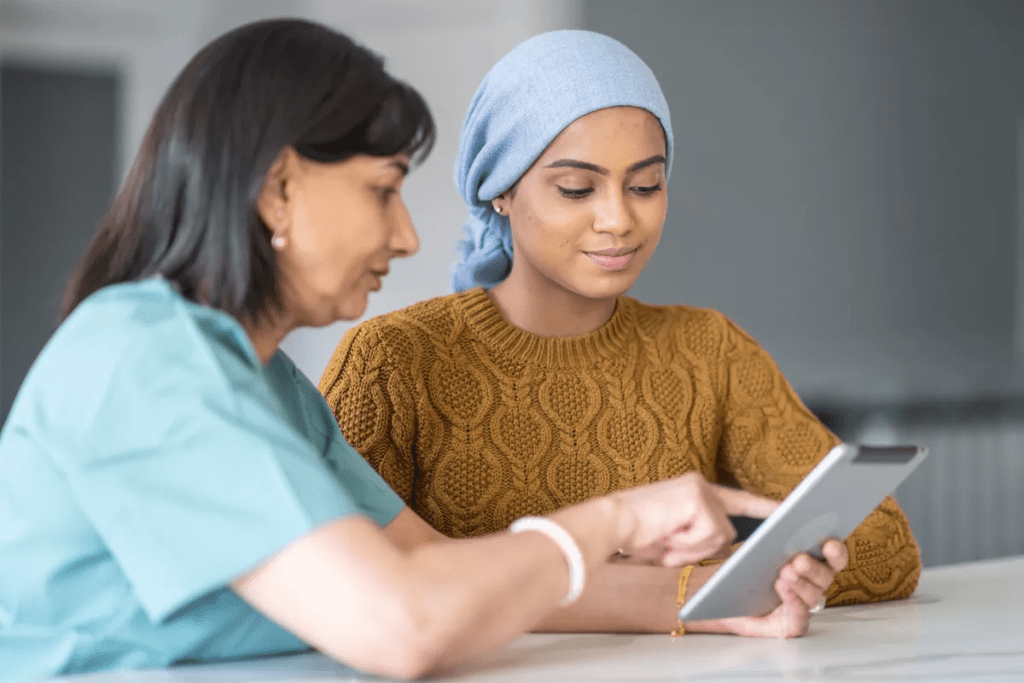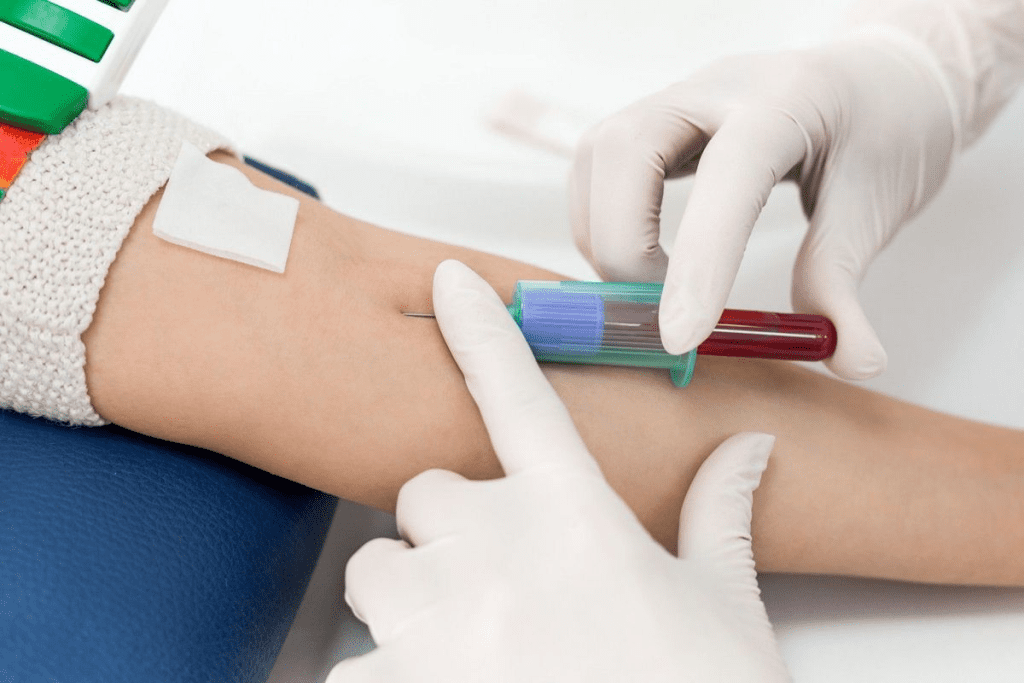Last Updated on October 21, 2025 by mcelik

The duration of a first oncology appointment can vary significantly.
The duration of a first oncology appointment can vary significantly. It usually includes a detailed check to get to know the patient’s situation well.
Knowing how long it will take and what to expect can ease some of the stress. It makes the experience less scary.
This step is crucial to ensure your oncologist has all the necessary information to provide optimal care.
At your first oncology visit, the main goal is to do a initial assessment and medical history review. You’ll share details about your health history, including past illnesses and family health. The oncologist will look over your medical records and test results to get a full picture of your health.
This review is very important. It helps the oncologist to:

This step is crucial to ensure your oncologist has all the necessary information to provide optimal care.
Important parts of a strong doctor-patient relationship include:
By focusing on these things during your first visit, you can build a strong base for your care. This helps you face the challenges ahead with confidence.
Patients often wonder how long their first oncologist consultation will last. The time can change based on several things. These include how complex the case is and the type of oncologist.
The first oncologist consultation can last from 30 minutes to several hours. Initial visits usually take longer. They include a detailed review of your medical history, a physical check-up, and talks about possible diagnoses and treatments.
For many, the first visit can be 45 minutes to an hour. But, if your case is more complex, the visit might be longer.
Several things can make your first oncologist consultation longer. These include:
Understanding these factors can aid in your appointment preparation. It can also help you understand how long it might last.
The journey to your first oncology visit starts with a referral process and gathering documents. This step is crucial to ensure your oncologist has all the necessary information to provide optimal care.
The referral process begins with your primary care doctor. They might think you need cancer care. They’ll send you to an oncologist based on your symptoms, medical history, and test results.
When you’re referred to an oncologist after blood tests, it means your primary care doctor found something unusual. Blood tests can show many things, like abnormal cell counts or tumor markers, which might mean cancer.
Before your first visit, gather all your medical records and test results. This includes biopsy reports, X-rays, MRIs, and your medical history. Having these ready helps your oncologist understand your situation better.
Your medical records should list any past treatments, allergies, and current medications. This info helps your oncologist create a good care plan for you.
Knowing what happens before your first oncology visit helps you prepare. Make sure you have all your documents and info ready. This will make the process easier and more efficient.
This step is crucial to ensure your oncologist has all the necessary information to provide optimal care.
There are many reasons a patient might see an oncologist. These include:
If these signs are seen, a doctor might send the patient to an oncologist for more checks and diagnosis.

Blood tests help check health and find problems early. Some results can show cancer or need more tests. For example:
If blood tests show something odd, a doctor might send the patient to an oncologist. There, they’ll do more tests to find out what’s wrong.
Knowing about the referral process and why it happens can make patients feel more ready. It helps them understand their cancer diagnosis and treatment better.
The duration of a first oncology appointment can vary significantly.
It’s important to bring all your medical records to your first appointment. These might include:
Organizing these documents before your visit can save time. It also helps your oncologist understand your health better.
Write down your symptoms, worries, and questions before you go. Your list might include:
| Symptom/Concern | Details to Include |
| Symptoms you’re experiencing | When they started, how long they’ve lasted, and any factors that make them better or worse |
| Previous treatments or medications | What you’ve tried, the dosage, and the results |
| Questions about your diagnosis | What it means, possible causes, and how it will be treated |
Being thorough in your notes can help make sure you cover all important topics during your visit.
Having someone with you at your first oncology visit is very helpful. They can:
The duration of a first oncology appointment can vary significantly.
Your first oncology appointment is a detailed check-up. It includes looking over your medical history and a physical exam. This visit is key to figuring out your treatment plan.
The oncologist will deeply review your medical history during your first visit. They’ll look at your past medical records, including any diagnoses, treatments, and test results. They’ll also ask about your family’s medical history to see if there are any genetic factors that might be important.
Key components of the medical history review include:
A physical exam is a big part of your first oncology visit. The oncologist will do a detailed check to see how you’re doing and find any signs or symptoms related to your condition.
The physical examination may include:
After the medical history review and physical exam, the oncologist will talk to you about what they found. They might share early diagnoses, treatment options, and the need for more tests or checks.
As a medical expert said,
“The first visit is an opportunity for the oncologist to establish a relationship with the patient and develop a personalized treatment plan.”
The duration of a first oncology appointment can vary significantly.
| Activity | Description | Purpose |
| Medical History Review | Examining past medical records and family history | To identify relevant medical information |
| Physical Examination | Assessing overall health and identifying signs or symptoms | To gather information about the patient’s condition |
| Discussion of Initial Findings | Sharing preliminary diagnoses and treatment options | To inform the patient and develop a treatment plan |
It’s important for cancer patients to know about the different types of oncologists. Oncology is the branch of medicine that deals with cancer. It includes various specialties, each with a key role in treatment plans.
Medical oncologists diagnose and treat cancer with therapies like chemotherapy and hormone therapy. They manage the treatment plan and work with other oncologists.
Key Responsibilities of Medical Oncologists:
Radiation oncologists treat cancer with radiation therapy. They work with the cancer care team to find the best treatment.
Role of Radiation Oncologists:
Surgical oncologists are surgeons who remove tumors and cancerous tissues. They work with a team for complete care.
Responsibilities of Surgical Oncologists:
| Procedure | Description |
| Tumor Resection | Surgical removal of tumors |
| Lymph Node Dissection | Removal of lymph nodes to check for cancer spread |
| Reconstructive Surgery | Surgery to restore appearance and function after tumor removal |
To become an oncologist, you need a lot of education and training. This includes medical school, residency, and sometimes fellowship training in oncology.
Knowing about the different oncologists helps patients understand their cancer care better. It ensures they get the right and complete treatment.
A gynecological oncologist treats cancers of the female reproductive organs. Your first appointment is a key moment in your care journey. It provides a detailed overview of your condition and a personalized treatment plan.
Gynecological oncology consultations focus on cancers of the female reproductive system. Your first appointment will cover your medical history and symptoms. The oncologist will also discuss the necessary diagnostic tests.
The specialist will explain different types of gynecological cancers. They will talk about how these cancers are diagnosed and treated. Understanding your specific condition is key to making informed decisions about your care.
During the examination, the gynecological oncologist will perform a physical exam. This may include a pelvic exam. This is important for assessing your condition and finding the best treatment options.
You can expect to discuss your diagnosis and the stage of your cancer. The oncologist will also talk about treatment options like surgery, chemotherapy, or radiation therapy. They will work with you to create a treatment plan that fits your needs and health status.
Having a support person at your appointment can be helpful. They can offer emotional support and help you remember important information.
Diagnostic tests are key to understanding your health. Your oncologist may order several during your first visit. These tests help make an accurate diagnosis and plan your treatment.
Blood tests are a common tool to check your health. They look for any abnormalities. Some common tests include:
A CBC can spot anemia, infection, or leukemia by checking your blood.
Imaging studies show what’s inside your body. They help find tumors and plan treatment. Common studies include:
| Imaging Study | Purpose |
| X-rays | Quickly check for tumors or other issues in bones and lungs. |
| Computed Tomography (CT) Scan | Shows detailed images of your body to find tumors and see their size. |
| Magnetic Resonance Imaging (MRI) | Provides detailed images of soft tissues, useful for examining organs. |
| Positron Emission Tomography (PET) Scan | Checks the metabolic activity of tissues, useful for detecting cancer spread. |
The American Cancer Society says, “Imaging tests can find cancer, see its size and location, and check if it has spread.”
A biopsy takes a sample of tissue or cells for examination. It’s key for diagnosing cancer and its type. There are several types of biopsies, including:
Knowing about diagnostic tests can ease anxiety and prepare you. Your oncologist will discuss the test results and the next steps in your care.
Being ready with the right questions can greatly impact your first visit to the oncologist. It’s key to grasp your diagnosis, treatment choices, and outlook to make smart decisions about your health.
Knowing your diagnosis is key to picking the right treatment. You might want to ask your oncologist:
Treatment choices depend on the cancer type and stage. Ask your oncologist about the options available, including:
Understanding your prognosis and treatment plan is essential. You might ask:
By asking these questions, you can better understand your diagnosis, treatment options, and prognosis. This knowledge helps you make informed decisions about your care.
The duration of a first oncology appointment can vary significantly.
The duration of a first oncology appointment can vary significantly.
Several things affect these wait times, including:
When cancer is suspected or diagnosed, getting an oncology appointment fast is very important. Patients or their caregivers can do a few things to try to make the wait shorter:
By knowing what affects wait times and taking action, patients can try to make their appointment sooner.
Going to your first oncology visit can make you feel many things. You might feel scared or hopeful. It’s normal to be unsure about what will happen next. But knowing what to expect can help a lot.
Understanding these factors can aid in your appointment preparation.
Managing anxiety and stress before your visit is essential.
Having a good relationship with your oncology team is key for your emotional health and treatment success. Open communication is the base of this relationship. Don’t be shy to ask questions or share your concerns. Your team is there to support you.
Building trust with your oncologist and team can make your treatment easier. They’re not just treating your illness. They’re also there to support you emotionally.
By being active and talking with your care team, you can face your first oncology visit with more confidence. It’s about taking charge of your health and getting the support you need.
This step is crucial to ensure your oncologist has all the necessary information to provide optimal care.
At your first oncology visit, you’ll go through a set process. It starts with a deep dive into your medical history. This involves:
After reviewing your medical history, a physical exam will follow. This exam checks your overall health and looks for signs of your condition.
Oncologists are known for being caring and clear in their communication. They make sure you understand your diagnosis and treatment choices. They will:
Good communication is vital for trust and comfort with your treatment plan.
Learning about your possible diagnosis can be tough. Your oncologist will explain your condition clearly and with care. They will cover:
As a medical expert noted,
“It’s important for patients to feel supported and informed during their cancer journey.”
Being ready for your first oncologist visit can greatly improve your experience. Knowing what to expect helps you navigate the process better and make informed choices about your care.
This step is crucial to ensure your oncologist has all the necessary information to provide optimal care.
Before your appointment, list your top questions and concerns. Write them down. This keeps you focused and ensures you cover the most important topics.
Here are some tips for prioritizing your questions:
Notes or a recording of your appointment are very helpful. They let you refer back to the information later. This way, you won’t forget important details.
Some benefits of taking notes or recording the appointment include:
Managing anxiety and stress before your visit is essential.
Here are some steps to follow up effectively:
| Action | Purpose |
| Ask for clarification | Ensure understanding of diagnosis and treatment |
| Request additional resources | Provide supplementary information for further learning |
| Schedule a follow-up appointment | Discuss progress and address new concerns |
By prioritizing your questions, taking notes or recording the appointment, and following up on unclear information, you can make the most of your oncologist consultation time. This way, you take an active role in your care.
The first oncology appointment can last from 30 minutes to several hours. This depends on the case’s complexity and the oncologist’s type.
The oncologist reviews your medical history and talks about your symptoms and concerns. They also do a physical exam to understand your condition better.
You might meet medical oncologists, radiation oncologists, or surgical oncologists. Each specializes in a different area of cancer treatment.
Bring all your medical records, test results, and a list of symptoms and concerns. This helps the oncologist understand your condition fully.
Gather your documents and make a list of questions and concerns. It’s also helpful to bring a support person to the appointment.
You might have blood tests, imaging studies, and biopsies. These tests help figure out your diagnosis and treatment plan.
Ask about your diagnosis, treatment options, and prognosis. Also, share any concerns or fears you have about your condition and treatment.
Wait times vary by location and urgency. On average, it can take days to weeks to get an appointment.
Build a supportive relationship with your care team and ask questions. Seeking emotional support from loved ones or support groups also helps.
Expect a detailed review of your medical history and a physical exam. You’ll also discuss your diagnosis and treatment options.
Prioritize your questions and concerns. Take notes or record the appointment. Follow up on any unclear information.
A gynecological oncologist deals with cancers affecting the female reproductive system. During your first appointment, you can expect a thorough examination and discussion of treatment options.
Bach, Y., et al. (2023). A prospective evaluation of patient“physician concordance during the first medical oncology visit. Psycho-Oncology. Retrieved from
Subscribe to our e-newsletter to stay informed about the latest innovations in the world of health and exclusive offers!